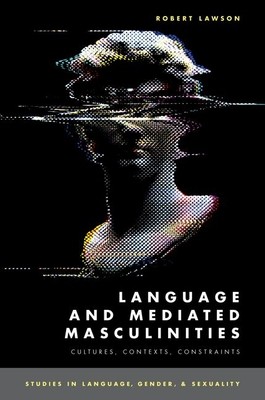
- We will send in 10–14 business days.
- Author: Robert Lawson
- Publisher: Oxford University Press, USA
- ISBN-10: 0190081058
- ISBN-13: 9780190081058
- Format: 15.5 x 23.6 x 1.9 cm, minkšti viršeliai
- Language: English
- SAVE -10% with code: EXTRA
Reviews
Description
From television shows to the manosphere, and from alt-right communities to fatherhood forums, debates about masculinity have come to dominate the media landscape. What does it mean to be a man in contemporary society? How is masculinity constituted in different media spaces? This growing cultural tension around masculinities has been discussed and analyzed both for general audiences and in burgeoning academic scholarship. What has been typically overlooked, however, is the role that language plays in these mediated performances of masculinity.
In Language and Mediated Masculinities, Robert Lawson draws on data from newspapers, social media sites, television programs, and online forums to explore language and masculinities across a range of media contexts. The book offers a critical evaluation of the intersection between language, masculinities, and identities in contemporary society and addresses three key questions: How are masculinities constructed, in both public and private spheres, through linguistic and discursive strategies? How does language about masculinity and men affect (and recreate) gender ideologies in different social, political, and historical contexts? What might the language of men tell us about the state of contemporary gender relations in the twenty-first century? Lawson furthers our understanding of how language is implicated in (re)creating gender ideologies and how it shapes contemporary gender relations. Against a cultural backdrop of rising neoliberalism, ethnic nationalism, online radicalization,networked misogyny, and fractious gender relations, this book is an important contribution to charting how language is used to monitor, evaluate, and police masculinities in online and offline spaces.
EXTRA 10 % discount with code: EXTRA
The promotion ends in 22d.09:05:31
The discount code is valid when purchasing from 10 €. Discounts do not stack.
- Author: Robert Lawson
- Publisher: Oxford University Press, USA
- ISBN-10: 0190081058
- ISBN-13: 9780190081058
- Format: 15.5 x 23.6 x 1.9 cm, minkšti viršeliai
- Language: English English
From television shows to the manosphere, and from alt-right communities to fatherhood forums, debates about masculinity have come to dominate the media landscape. What does it mean to be a man in contemporary society? How is masculinity constituted in different media spaces? This growing cultural tension around masculinities has been discussed and analyzed both for general audiences and in burgeoning academic scholarship. What has been typically overlooked, however, is the role that language plays in these mediated performances of masculinity.
In Language and Mediated Masculinities, Robert Lawson draws on data from newspapers, social media sites, television programs, and online forums to explore language and masculinities across a range of media contexts. The book offers a critical evaluation of the intersection between language, masculinities, and identities in contemporary society and addresses three key questions: How are masculinities constructed, in both public and private spheres, through linguistic and discursive strategies? How does language about masculinity and men affect (and recreate) gender ideologies in different social, political, and historical contexts? What might the language of men tell us about the state of contemporary gender relations in the twenty-first century? Lawson furthers our understanding of how language is implicated in (re)creating gender ideologies and how it shapes contemporary gender relations. Against a cultural backdrop of rising neoliberalism, ethnic nationalism, online radicalization,networked misogyny, and fractious gender relations, this book is an important contribution to charting how language is used to monitor, evaluate, and police masculinities in online and offline spaces.


Reviews